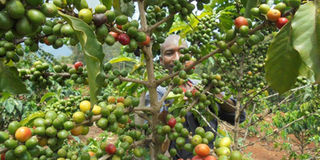Proposal to pay coffee farmers directly reversed

Mr Kenneth Koome tends a coffee tree. A coffee task force has proposed that farmers’ payments be deposited into cooperative accounts. PHOTO | FILE | NATION MEDIA GROUP
What you need to know:
In this system, cooperatives are to receive cash directly from the Nairobi Coffee Exchange then remit it to farmers after deductions.
The committee’s findings have split farmers, with some proposing direct pay and others opting for cooperatives.
Other farmers have also rejected the proposal to have cooperatives pay them Sh15 immediately they deliver their produce to factories.
Farmers from Mt Kenya region have called for the disbandment of the task force, saying they were never consulted.
A task force has reversed a proposal to pay coffee farmers directly for produce delivered.
The team, formed by President Uhuru Kenyatta, has instead said the payments should be channelled through cooperatives.
Initially, the task force had settled for direct payments in proposals forwarded to the President, but which have not yet been implemented due to a number of cases in court.
But during a meeting with farmers in Nyeri, implementation committee chairman Joseph Kieyah proposed that farmers’ payments be deposited into cooperative accounts through a Direct Settlement Scheme (DSS).
RECEIVE CASH
In this system, cooperatives are to receive cash directly from the Nairobi Coffee Exchange then remit it to farmers after deductions.
The system will replace the proposal to have farmers paid through a Central Depository Unit (CDU) through which a farmer would open an account into which the proceeds of his coffee would be wired after sale at the Nairobi auction.
“The DSS is a banking service to the Nairobi Coffee Exchange that will be provided by a financial institution to expedite settlement and direct payment of coffee proceeds to growers and their service provider,” said Mr Kieyah.
The committee’s findings have split farmers, with some proposing direct pay and others opting for cooperatives.
Some had opposed the formation of the CDU, saying they would be compelled to remit their proceeds from the auction and direct sales to the pool system, which would not guarantee them payment.
PAYING FARMERS
“Only marketers should be responsible for the money that is to be remitted to our accounts,” said Gikanda society chairman Joseph Mukuha, adding that the committee did not state in what currency they will be paying farmers.
Farmers said the move to upgrade the Nairobi Coffee Exchange into a fully-fledged commodity exchange will promote monopoly by making the it the sole marketing agent.
“The board is dominated by the government which is not answerable to the growers. We have no contract with the coffee exchange. We are not aware of the criteria they use while selling coffee,” he said.
Other farmers have also rejected the proposal to have cooperatives pay them Sh15 immediately they deliver their produce to factories.
DISBANDMENT
Farmers from Mt Kenya region have called for the disbandment of the task force, saying they were never consulted.
Prof Kieyah said the committee had only made a few changes to the coffee regulations that were heavily contested by farmers and the then Council of Governors.
Meanwhile, coffee cooperatives in Nyeri will this year pay farmers less than the previous year as production declined due to poor weather.
As farmers begin receiving payments, none of the high paying cooperatives have awarded farmers Sh100 per kilo of coffee as was the trend last year.





